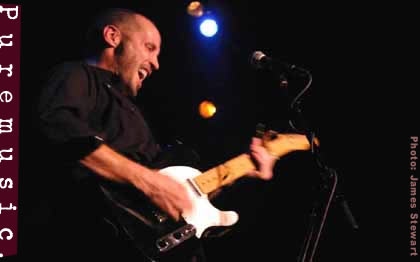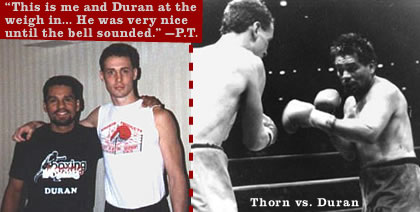
A Conversation with Paul Thorn (continued)
PT: But his punches were just cutting me like a knife, man. I mean, my lip was cut real bad, and my forehead had a cut really bad. And they stopped it, basically, because I couldn't see through blood going in my eyes.
PM: Oh, that's what happened. The fight was stopped because you were cut up.
PT: Yeah, it was stopped because I was cut up.
PM: Wow. What city was the fight in?
PT: It was in Atlantic City, New Jersey. And it was televised on USA Tuesday Night Fights. Yeah, it was something, man.
PM: Holy jeez. And who was the referee?
PT: The referee was Randy Newman--not the singer.
PM: [laughs] I guess not.
PT: Yeah. But Randy Newman the referee, yeah. And yeah, there's footage on the little documentary, there's footage of me and Duran fighting. There's footage of me working in [laughs] the factory. And there's footage of me--you know, it was back in '93 when my hair was a little bit thicker and my waist was a little bit thinner.
[laughter]
PM: Not so much thinner, though. You seem to be in pretty damn good shape today.
PT: Well, when I fought, I weighed 150 pounds, and now, at the age forty-one, I weigh 195 pounds.
PM: Wow!
PT: Yeah. Well, back there I was real skinny because--
PM: Oh, yeah, you had a wicked six-pack. I've seen the photos.
PT: --if you're boxing, boxing is not a sport of strength, it's a sport of cardio. And I was all cardio. I mean, I was in tremendous cardiovascular shape. And now I lift weights all the time. And I look in shape, but I'm not in shape. [laughs]
PM: Right. And I guess somebody that hasn't been in the ring doesn't know that, that it's not really a power game, it's a cardio game.
PT: It's a cardio game, yeah, because unless you're a heavyweight, everybody you fight weighs within two or three pounds of the same weight you do. So being heavy doesn't really have any advantage at all.
PM: No, absolutely not. In fact, however heavy you are, you better be as tall as possible.
[laughter]
PT: That's true, yeah.
PM: How tall are you?
PT: I am six foot tall.
PM: Oh, really?
PT: Yeah, yeah.
But being a boxer was such a wonderful experience for me, because one thing it did is it helped me learn how to face my fears. That was my biggest--I don't want go off on this boxing thing too much, I know it's a music webzine, but--
PM: But you're talking to somebody who loves boxing, so that's cool to hear about, too.
PT: Well, my biggest problem as a boxer, and what separates good from great, it's really not ability as much as it is mental confidence. If somebody goes out there--well, the way I compare me and Duran, when Duran was walking through the ring, he was licking his lips. When I walked in the ring, I was shitting my pants.
PM: [laughs]
PT: And that's the difference, because even though I became a pretty good fighter, I never had the confidence that you have to have to be great. The secret to being great at anything is being able to relax under extreme pressure.
PM: Right.

PT: And people who can get on stage and--I feel blessed, I feel that I have that as a singer, because you know, my dad being a Pentecostal preacher, I've been singing in front of congregations since I was three years old, so I can go in front of ten people or 10,000 people and be totally relaxed. And that has really served me well in the music business. And going through all that fear that I felt when I was boxing really prepared me, even more, for being on stage as a singer and songwriter.
PM: Very interesting. I mean, since everybody can, and everybody does, make a record today, it really comes down to who's got the songs.
PT: Yep.
PM: And God bless you, you've got the songs.
PT: Well, the songs--yeah, the songs and everything, but unfortunately, in mainstream music, songs are not even important anymore.
PM: No.
PT: It's just they've got to get you a stylist, you've got to take your shirt off, you've got to get your six-pack back, you've got to stand by the beach, you've got to lay on the sand and let--
PM: [laughs]
PT: --let the water tweak your nipples and all that.
[laughter]
PT: And if you're bald-headed, you got to put a hat on.
PM: Yeah, absolutely.
PT: But I've got a new philosophy about all that: I think embracing where you are at the time of your life, that's what's sexy, not trying to cover up and use ten bottles of Oil of Olay every week.
PM: Yeah.
PT: And just be who you are, then you'll be sexy, then you'll be good. And then if you put a real song in there with it, you're off to the races. [laughs]
PM: Absolutely. And embracing who you are is where that confidence that you're talking about comes from.
PT: Right, yeah. My philosophy in life is "You got to learn to love yourself before you can love anybody else."
PM: Yeah.
PT: And that doesn't mean look in the mirror and say, "Look how beautiful I am," it doesn't mean vanity in an uncool vain way. I mean, just love yourself, and take a healthy pride in who you are, and insist on quality.
PM: And I can tell from the way you are and the way your songs go, that you know that if you're not really loving people--and I don't mean just your friends or just your family, but people--you're not really living.
PT: Huh-uh, nope, no. It's a big group.
PM: It's about loving people.
PT: Absolutely. Even though I'm not a famous artist, I've had the benefit of being around some of the most famous artists in the world. And one thing I've learned, a lot of them make a mistake of thinking when they go out on stage that they're doing the audience a favor by showing up. Well, in reality it's the exact opposite. The audience is doing them a favor, because if the audience don't show up, they ain't got a job.
PM: Right.
PT: So that's why every night I go out, if there's some people out in the front, I just got to give them everything I can, because without them, I don't have anything, I'm going back to the chair factory.
PM: That's right.
PT: I couldn't beat Duran, so for me--
PM: [laughs] "So it's the chair factory or the stage for me." Right.
PT: Well, the chair factory is--anybody can do that, that's just a motor reflex--I mean, a trained monkey could do that. But this is something I can do that I feel that God gave me a talent for, and I don't want to abuse it, I want to use it.
PM: Right. continue
print (pdf) listen to clips puremusic home